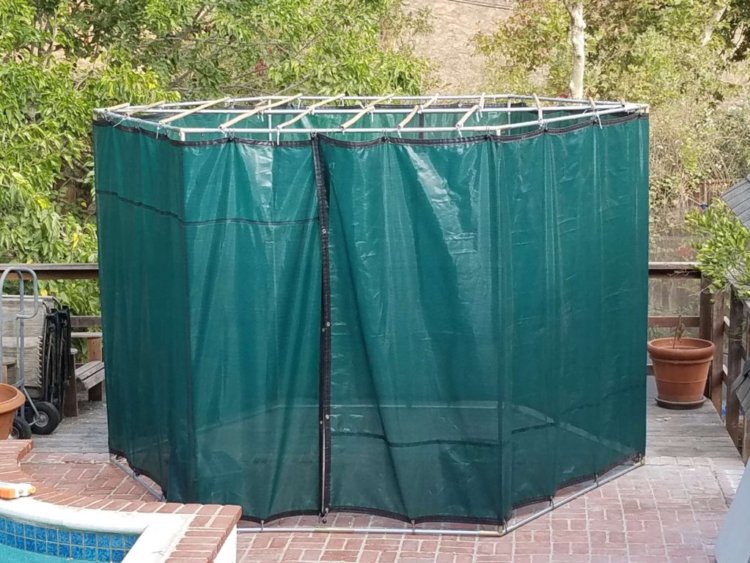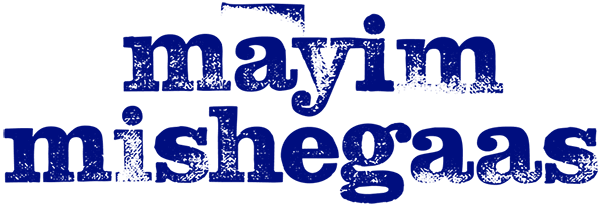
[Photo: Mayim’s own funky hexagonal Sukkah that she uses for the holiday of Sukkot]
It’s the time of year where Jews kind of lose their minds. There is basically a holiday every week this month, and for those of us who celebrate traditionally, these holidays interrupt life as we know it. It makes many of us feel super out-of-sorts.
GrokNation has gone dark for two days of the starts of the Jewish New Year, Rosh Hashanah, as well as for Yom Kippur, the Day of Atonement which marks the end of the New Year. So now what? Well, the autumn harvest festival of Sukkot starts Sunday night and again everything shuts down for two days. I know! A week later, the end of the Sukkot holiday interrupts life as we know it. Again. I KNOW!
My kids are 11 and 8 and don’t go to a religious Jewish Day School so the Jewish calendar is dictated to them by their dad and me; we don’t have any school giving them a heads up as to when holidays happen. It’s up to us and their Hebrew and Jewish studies tutor.
So we say when they will miss classes and when they need to put on dress pants and collared shirts and eat fancy meals and make blessings over strange (and not-so-strange) foods.
I love my kids and they are special people. I know every mom says that, and I am willing to grant that other kids are special, too. But at times like the holidays, when presented with the challenges of all of the schedule mishaps that the Jewish holidays bring about, my kids do pretty well.
They have a lot of questions. It’s a kid thing. They ask things like:
- “Mama, why do we have to go to shul (synagogue)?”
- “Mama, why is synagogue so long?”
- “Why do we have to miss school to go to synagogue?”
These are normal kid questions; and they are actually perfectly acceptable adult questions, too.
The responses are rather sterile:
- We go to synagogue to pray with other Jews for a fortuitous New Year because our Torah tells us to.
- The prayers used to be done as a meditative practice and there is a lot of repetition.
- Jews are less than 2% of the United States population and while certain school districts (such as New York and Los Angeles, for example) close on Jewish holidays, many extracurricular activities and private schools and other such things do not close on Jewish holidays. We miss things that the secular world participates in because we are different; our calendar is different.
With Sukkot coming up, I anticipate more of the same kinds of questions:
- “Mama, why do we build this tent or hut in the backyard and eat our meals in it?”
- “Why do we wave a weird lemon and a bunch of leaves around all over our heads?”
Also good questions. Again, the answers are kind of sterile:
- The Torah tells us to build tents or huts, in Hebrew known as “sukkot” (the singular is “sukkah”), and to dwell in them to experience what our ancestors did thousands of years ago.
- We wave an Etrog (citron fruit, which looks a little like a lemon but isn’t exactly a lemon) and Lulav (a collection of three different branches of leaves) around as a traditional way to unite the harvest season with the things it produces.
But the larger question, which my children ask me and which I also get asked by a lot of adults, both Jewish and non-Jewish is:
“Why do we do things people did thousands of years ago; haven’t we evolved?
And as a follow up:
“Why does any of this matter?”
These are great questions. They are great in two ways: because difficult questions are often the best questions, and Judaism loves hard questions; and because they are grand…they deal with huge things. Like, the hugest, really.
I was born Jewish. I’m ethnically Jewish and I’m spiritually bound to Jewish life and Jewish practice. We have evolved so much from thousands of years ago; all cultures have. Our understanding of the modern world is so different than it was even 50 years ago. Judaism allows for change and we have changed a lot for sure.
What hasn’t changed, though, is human nature. And that’s why I keep returning to Jewish observance. The challenge I am confronted with from my practice as a Jew is to keep making myself better. That’s the goal. Clear away the negative and make room for being a giving loving human being. Avoid gossip and dishonesty. Go out of your way to help other people and to constantly add to the planet with your existence. Be humble, welcome the stranger and be an example of Divine behavior.
Are there Jews who don’t do these things? Of course. Are there horrible people who happen to be Jews, and who do terrible things instead? I’m sure there are. But that doesn’t mean the system is broken; it means that the system is put in place by humans, and we are not perfect.
The time I spend in synagogue is uplifting and therapeutic. I enjoy my children seeing me take part in our community and I take pride in their clapping hands and their smiling faces. I want them to one day see themselves as part of a people who has set as their charge the task of perfecting a broken world. For thousands of years, our tradition has taught us how to become better people; more helpful, more caring, more gentle. I want that for my sons.
And so as we gear up for Sukkot and as my sons decorate our sukkah and help me set up the table and chairs where we will host friends and family this coming Sunday night, they may make snarky comments such as, “Why do we have to drag the chairs all the way outside?” and I will answer in two ways.
The first way will be a bit sterile. The second way has the power to penetrate their youthful questioning and transform them from objects of a fractured world into subjects of a world within their grasp to change.
Why does any of this matter? Because the way we behave matters. The life we live matters. The things we do and the rituals we choose make for behaviors that make our life worth living and worth sharing with others.
There are many ways to commemorate the autumn. As your week unfolds, I hope you find ways that elevate your spirit, reinvigorate your desire to transform yourself and renew your faith in change.
Happy Autumn and Chag Sukkot Sameach (a happy Sukkot holiday to all).




 Read More From Mayim
Read More From Mayim
Grok Nation Comment Policy
We welcome thoughtful, grokky comments—keep your negativity and spam to yourself. Please read our Comment Policy before commenting.